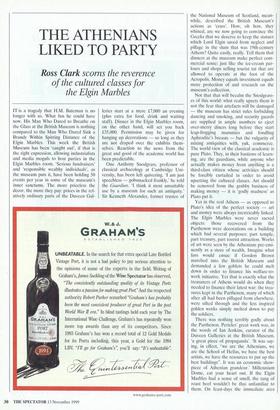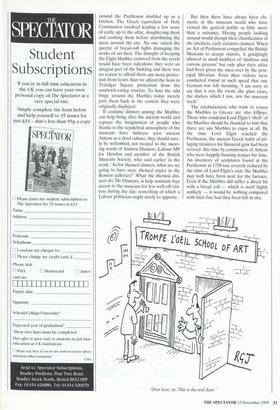THE ATHENIANS LIKED TO PARTY
Ross Clark scorns the reverence of the cultured classes for the Elgin Marbles
IT is a tragedy that H.M. Bateman is no longer with us. What fun he could have now. His Man Who Dared to Breathe on the Glass at the British Museum is nothing compared to the Man Who Dared Sink a Brandy Within Spitting Distance of the Elgin Marbles. This week the British Museum has been 'caught out', if that is the right expression, allowing industrialists and media moguls to host parties in the Elgin Marbles room. 'Serious fundraisers' and 'responsible wealthy individuals', as the museum puts it, have been holding 50 events per year in some of the museum's inner sanctums. The more priceless the decor, the more they pay: prices in the rel- atively ordinary parts of the Duveen Gal- leries start at a mere £7,000 an evening (plus extra for food, drink and waiting staff). Dinner in the Elgin Marbles room, on the other hand, will set you back £35,000. Permission may be given for hanging up decorations — so long as they are not draped over the exhibits them- selves. Reaction to the news from the great and good of the academic world has been predictable.
One Anthony Snodgrass, professor of classical archaeology at Cambridge Uni- versity, has been left quivering. 'I am just speechless — gobsmacked frankly,' he told the Guardian. 'I think it most unsuitable use by a museum for such an antiquity.' Sir Kenneth Alexander, former trustee of
the National Museum of Scotland, mean- while, described the British Museum's actions as 'crass'. How, oh how, they whined, are we now going to convince the Greeks that we deserve to keep the statues which Lord Elgin saved from neglect and pillage in the slum that was 19th-century Athens? Quite easily, really. Tell them that dinners at the museum make perfect com- mercial sense: just like the ice-cream par- lours and shops selling tourist tat that are allowed to operate at the foot of the Acropolis. Money equals investment equals more protection of and research on the museum's collection.
Not that that will becalm the Snodgrass- es of this world: what really upsets them is not the fear that artefacts will be damaged — the museum has strict rules forbidding dancing and smoking, and security guards are supplied in ample numbers to eject over-merry diners long before they start leap-frogging mummies and fondling Aphrodite's breasts — but the vulgarity of mixing antiquities with, yuk, commerce. The world view of the classical academic is pure Plato. They, in their bastions of learn- ing, are the guardians, while anyone who actually makes money from anything is a third-class citizen whose activities should be forcibly curtailed in order to avoid upsetting the cultured classes. Art should be removed from the grubby business of making money — it is 'godly madness' as Plato put it.
Yet in the real Athens — as opposed to Plato's idea of the perfect society — art and money were always inextricably linked.
The Elgin Marbles were never sacred objects: those recovered from the Parthenon were decorations on a building which had several purposes: part temple, part treasury, part tourist attraction. Works of art were seen by the Athenians pre-emi- nently as a store of wealth. Imagine what fuss would ensue if Gordon Brown marched into the British Museum and demanded a few goblets he could melt down in order to finance his welfare-to- work initiative. Yet that is exactly what the treasurers of Athens would do when they needed to finance their latest war: the trea- sures kept in the Parthenon, many of which after all had been pillaged from elsewhere, were sifted through and the less inspired golden works simply melted down to pay the soldiers.
There was nothing terribly godly about the Parthenon. Pericles' great work was, in the words of Ian Jenkins, curator of the Duveen Galleries at the British Museum, 'a great piece of propaganda'. 'It was say- ing, in effect, "we are the Athenians, we are the School of Hellas, we have the best artists, we have the resources to put up the best buildings". It was an economic show- piece of Athenian grandeur.' Millennium Dome, eat your heart out. If the Elgin Marbles had a sense of smell, the tang of roast beef wouldn't be that unfamiliar to them. On feast-days the immediate area around the Parthenon doubled up as a kitchen. The Greek equivalent of Holy Communion involved leading a few score of cattle up to the altar, slaughtering them and cooking them before distributing the meat around the city. No one raised the spectre of bread-roll fights damaging the works of art then. The thought of keeping the Elgin Marbles removed from the revels would have been ridiculous: they were an integral part of the building and there was no reason to afford them any more protec- tion from feasts than we afford the lions in Trafalgar Square protection from the sandwich-eating tourists. To host the odd binge around the Marbles today merely puts them back in the context they were originally displayed.
If costume dinners among the Marbles can help bring alive the ancient world and capture the imagination of people who thanks to the sepulchral atmosphere of the museum have hitherto seen ancient Athens as a dead culture, they should sure- ly be welcomed, not treated to the sneer- ing words of Andrew Dismore, Labour MP for Hendon and member of the British Museum Society, who said earlier in the week, As for themed dinners, what are we going to have next: themed orgies in the Roman galleries?' What the themed din- ners do, Mr Dismore, is help maintain free access to the museum for less well-off visi- tors during the day: something of which a Labour politician ought surely to approve. But then there have always been ele- ments in the museum world who have viewed the general public as little more than a nuisance. Having people looking around would disrupt their classification of the artefacts, early curators claimed. When an Act of Parliament compelled the British Museum to accept visitors, it grudgingly allowed in small numbers of 'studious and curious persons' but only after their attire had been given the once-over by the prin- cipal librarian. Even then visitors were conducted round at such speed that one German was left moaning, 'I am sorry to say that it was the room, the glass cases, the shelves which 1 saw, not the museum itself.'
The retributionists who want to return the Marbles to Greece are also killjoys. Those who condemn Lord Elgin's 'theft' of the Marbles should be thankful to him that there are any Marbles to enjoy at all. By the time Lord Elgin reached the Parthenon, the ancient Greek habit of pil- laging treasures for financial gain had been revived: this time by commoners of Athens who were happily burning statues for lime. An inventory of sculptures found at the Parthenon in 1750 was severely reduced by the time of Lord Elgin's visit: the Marbles may well have been next for the furnace. Even if the Marbles did suffer a direct hit with a bread roll — which is itself highly unlikely — it would he nothing compared with their fate had they been left in situ.
Over here, sir. This is the lea! door.'



























































































 Previous page
Previous page